This was supposed to be the content marketing year for your business.
Your team had meticulous plans for generating content and improving revenue.
Then COVID-19 happened and all those plans seemed to have come to naught.
But wait.
Don’t give up just yet.
Your strategies and keyword research may no longer be relevant to the current pandemic market, but there is still room for adaptation.
Despite how dire the situation might seem, I can tell you that there is a way to use the changing search trends of the pandemic age to ideate and execute new content.
If you’re wondering how that’s possible, let me guide you through the process below.
Repositioning Marketing Strategies
First and foremost, marketers need to know that following the strategies that worked in 2019 – or even in January-February of 2020 – isn’t going to cut it.
The world has changed too much for that. And it’s going to keep changing.
Businesses have already begun to update their crisis communication plans but this is going to be an ongoing process.
COVID-19 isn’t going away very soon – we will be feeling its lasting impact on the economy and the way we work well into 2021 and beyond.
This is why collating data and using it to propel your content marketing needs to be a priority.
I mean, when was the last time finance and investments saw a 280% increase in search popularity?

The data we acquire during this period is going to inform the gaps in the market that your business can enter or expand in.
And by understanding the data we have, we can better place the company as a positive resource for clients and customers.
Audience needs are changing and your marketing strategy needs to change accordingly. You have to pivot your strategies toward empathy.
What does that mean and how can you implement it?
That is what I will be explaining in this guide.
The frameworks I have designed will show you how to use search trend data so you can create the content that your audience needs right now.
You can use a number of digital marketing tools to mine the information I will be talking about.
1. Search for Market Gaps
One of the most all-encompassing fallouts of the pandemic has been the rise in remote work.
And because of the number of people working at home, there has been a resultant increase in how many people are using the internet.
With nowhere else to go to entertain ourselves, we are all spending our time online for work, leisure, and to update ourselves on the latest news.
People are spending more time on streaming sites and on networking apps to stay in touch with their friends and family.
That is a critical piece of data for you – your audience is now wholly and completely online, especially on social media.
You don’t need to look for them because you know where they are.
Now that you know where they are, you need to analyze how and why they are using the online tools available to them.
Take a look at this graphic from Microsoft Advertising.
What do you see?
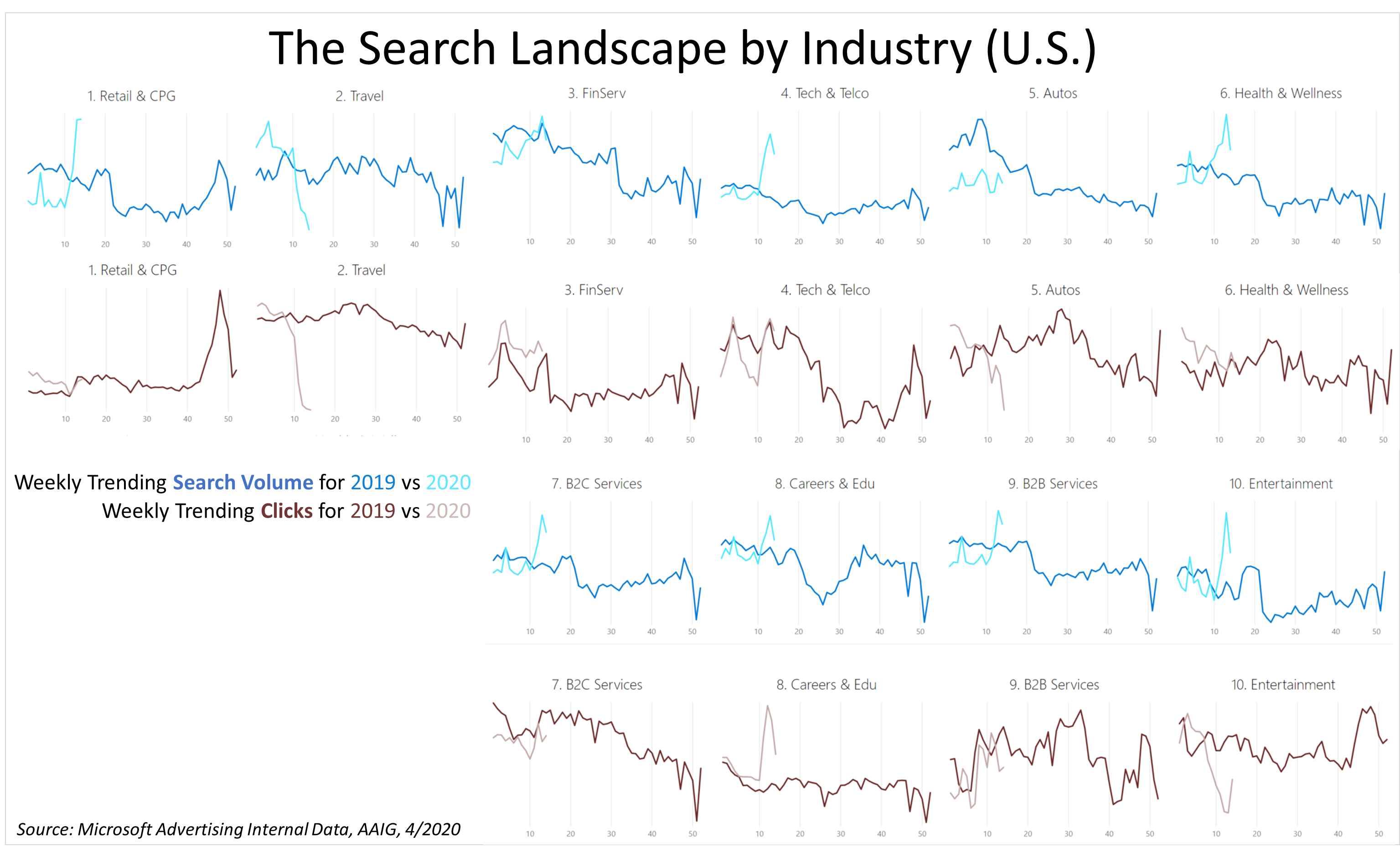
You can see that searches for certain industries have been impacted dramatically.
Travel and autos have fallen – likely because nobody is going anywhere. On the other hand, tech and entertainment are seeing increases, for obvious reasons.
But while searches for specific travel-related and automotive-related terms will have decreased, by widening your search, you can still find ways to utilize topics in those industries.
For instance, people aren’t looking for auto insurance now – they aren’t using their cars as much, so they don’t want to increase their premiums.
But what they will be searching for are ways to maintain their car when it’s not in use – car covers, seat liners, oils and varnishes for their engines and paint job.
When the shutdowns have impacted your business, it can seem disheartening to look at the popularity of your search terms drop.
However, with a bit of creativity, you can find the areas where related searches are spiking so you can re-enter the market through those terms.
You will find that people aren’t leaving entire industries behind – they’re just looking for new items and services within that industry.
Those are the areas that you now need to focus on when creating your content – look at the new keywords trends in your industry, suss out the patterns, and build your content.
2. Analyze Search Trends
What we have found above is that not only does data exist within industries affected by COVID-19, but that there are ways to infer ideas from that data.
Let’s delve deeper into how that inference can work for you.
Some of the biggest hit industries during lockdown have been restaurant businesses.
People aren’t able to go to restaurants during the lockdown, and that has impacted popular search terms that the industry would have relied on.
Here’s what we found when we looked into search trends in the live entertainment and restaurant industry:

January and February – pre-crisis months – saw an increase in these areas because people were regularly going out.
March saw a significant decrease following the announcement of the lockdowns, and April saw that number drop even further.
If we dive deeper into specific search terms within the industry, the picture becomes clearer.
Take a look at the search trends we examined for the term “best restaurants near me”:
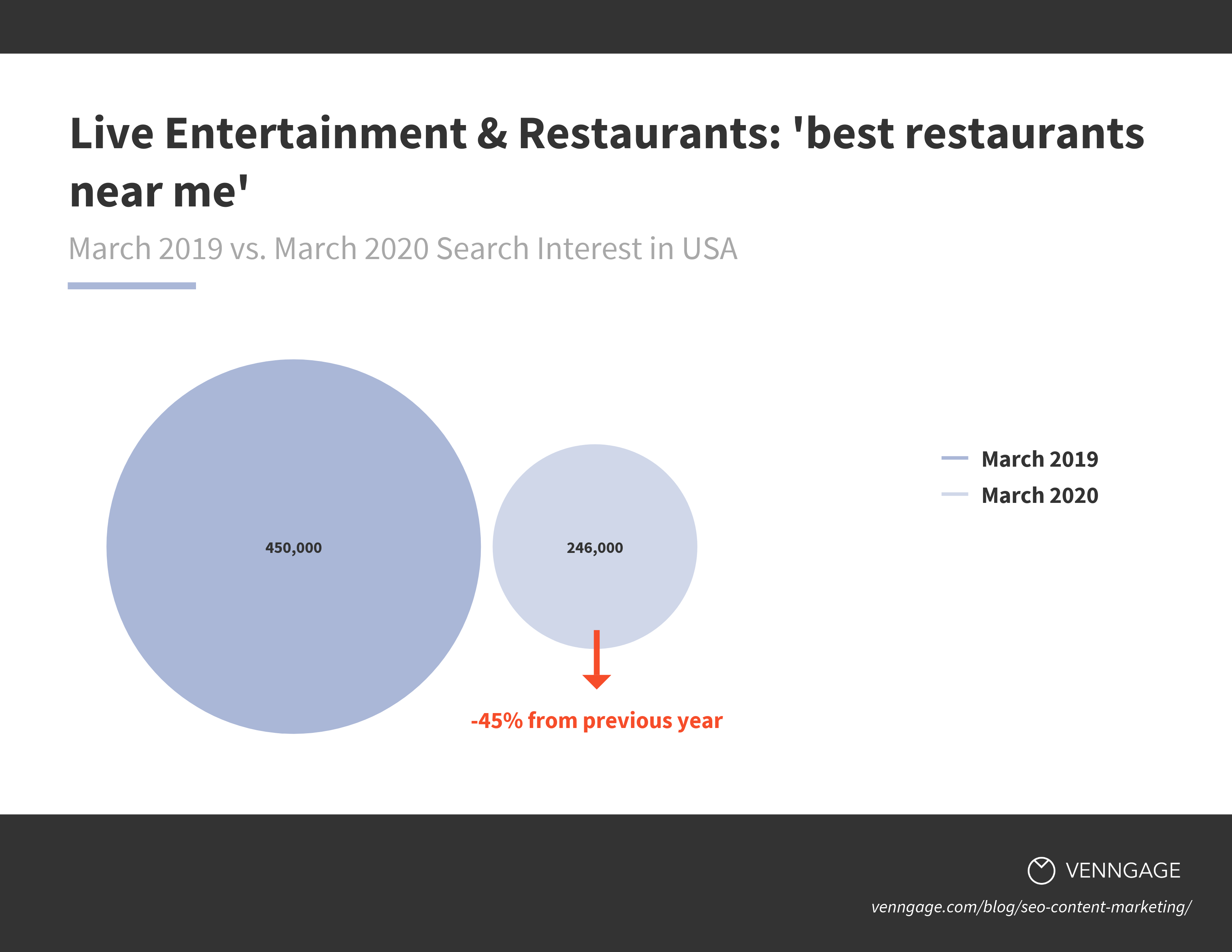
The 45% drop in 2020 is in stark contrast to the term’s popularity in 2019 when the world wasn’t in crisis.
But that doesn’t mean that people aren’t interested in restaurants at all.
It isn’t possible for most people to cook every single meal – they still want restaurant-quality food even at home.
So, what are they searching for to alleviate this concern?
They are looking for food deliveries and pick-ups.
Look at the search trend comparison we made for “best restaurants near me” versus “food delivery” over the last few months:
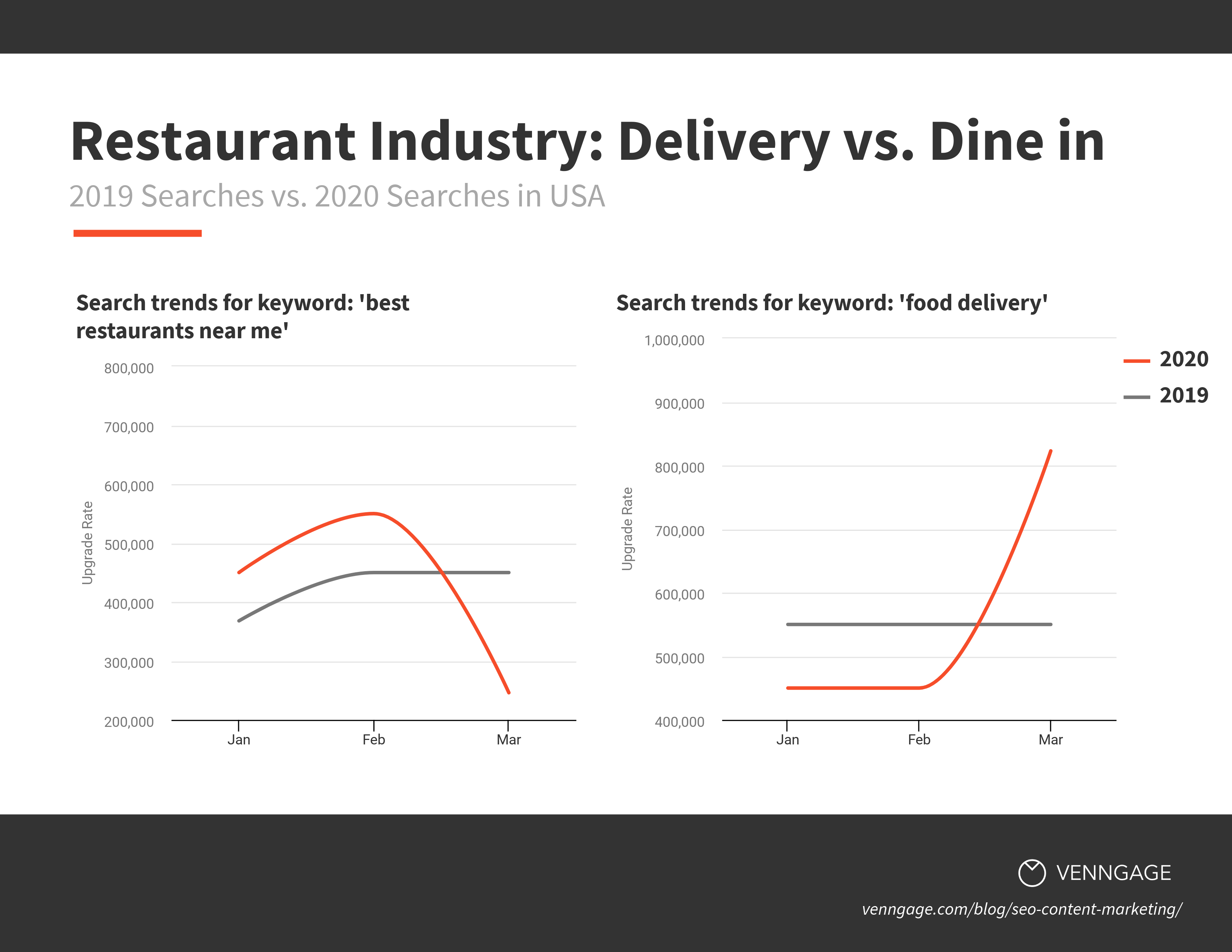
What can we infer from the above search trend data?
That people are open to looking for alternatives – restaurants are still relevant but the search terms directly related to them have changed.
This means that restaurants now need to create content that moves away from terms related to geographic location and more towards food delivery and pick up.
3. Pivot for Customers
Let’s step away from the service industry and look at a product-based industry such as gaming.
Look at the popularity of the search terms for Nintendo Switch in the March-May 2020 period, as compared to last year.
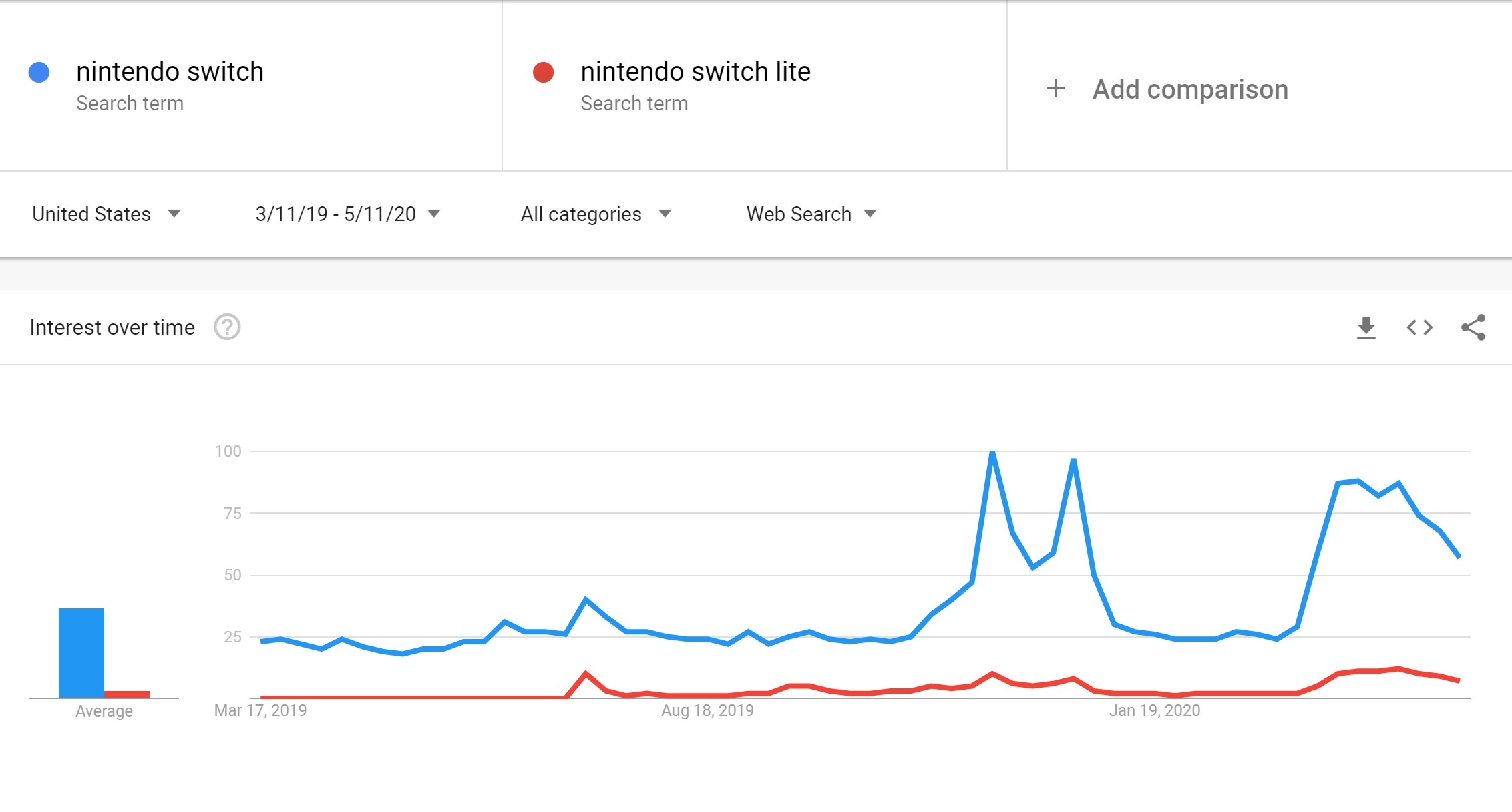
The spike is huge, rivaling the trends we would see during December’s holiday rush.
Since people are spending more time indoors, they are looking for products to keep themselves engaged and entertained. Hence the need for a gaming console.
Here’s what we can tell from the increased popularity of this search term:
- People want more access to in-home entertainment than before.
- Because they are self-isolating, they have more time to indulge in leisure activities.
- Gaming consoles are selling out fast, leading to a shortage of supply.
Once you make these inferences, you can adapt your content structure – what can your product do for your customers at this moment?
If you are an entertainment-based business, here are some marketing tips to use the search trend data to your advantage:
- You can create content about entertainment options for your audience.
- You can create entertaining pieces for your audience.
- You can share alternatives for people who can no longer purchase a Nintendo Switch.
But knowing how to adapt to the changing circumstances we face now doesn’t mean that your job is done.
The times will continue to change and you need to be able to grow despite the changes. Let me explain how.
4. Content Ideation Framework
The examples I have shared with you make sense in their own right – but can you apply them to your niche brand?
Brainstorming content ideas is always a challenge but I have been using a content strategy framework that has worked for me for years.
The framework I am talking about is GRAP.

Let me break down each point for you.
Goals
The overarching goal of your content strategy will have changed due to the pandemic. This affects the way you create marketing materials.
Is your goal during this period to sell products or services? Or is it to increase brand awareness?
You need to have a definitive destination in mind for your strategy before you start using search trends to create content.
Research
Even when you’re searching for trends in your industry, it’s important to research why and how your audience is using those terms.
Understanding the consumer behavior behind an action will make it easier to create impactful content.
Authority
Here’s a question that your audience asks every time they come across content online:
Who are you and why should I read your content instead of someone else’s?
- Have you created content in the same area before?
- Are your SERP results strong?
- Do Google, Moz, and Ahrefs value your content contributions?
If you can answer these questions in the affirmative, you are probably an authority in your field and will be able to create content that will generate interest and value.
Promotion
Developing great content isn’t the same as it being seen.
If your SEO and SERP are strong, that means you are doing something right in the promotion department.
But let’s go back to the beginning of this exercise – where did we say your audience is spending their time during this pandemic?
Online.
There is a lot of content online already, with more being created on a daily basis during this crisis.
If you want to be seen, you need to improve the way you promote your content. Here are some general guidelines for doing that:
- Don’t be afraid to promote far and wide and on as many channels as possible.
- Link build with purpose – this improves your SERP.
- Engage on social media – don’t just post and leave.
Once you get a handle on the GRAP framework, you will be better positioned to generate more content ideas.
5. Cross-Over Content Ideation
What is cross-over content ideation?
It’s taking a content idea and altering it to suit a situation.
You must have read about the many companies that pivoted their product development strategies for the coronavirus.
Companies that were creating chemicals, trackers, or fashion accessories have pivoted to making hand sanitizers, proximity detectors, and surgical masks.
These businesses realized that their original products would not be useful in the crisis situation so they crossed over to building items that would be necessary for the community.
By pivoting in this way, these businesses managed to save themselves – quite the feat at a time when so many businesses are having to close down.
And you can follow their example.
Start by using Google Keyword Planner and following these steps:
- Plug in a search term you usually associate with your brand.
- Don’t be alarmed when you see that it has fallen in the search trends.
- Look at the related keywords – specifically the ones trending since March 2020.
- These are the crossover content keywords that you should be aiming for.
For example, in the travel industry, we looked at luggage-related keywords like “carry on bag”. This is what we found:
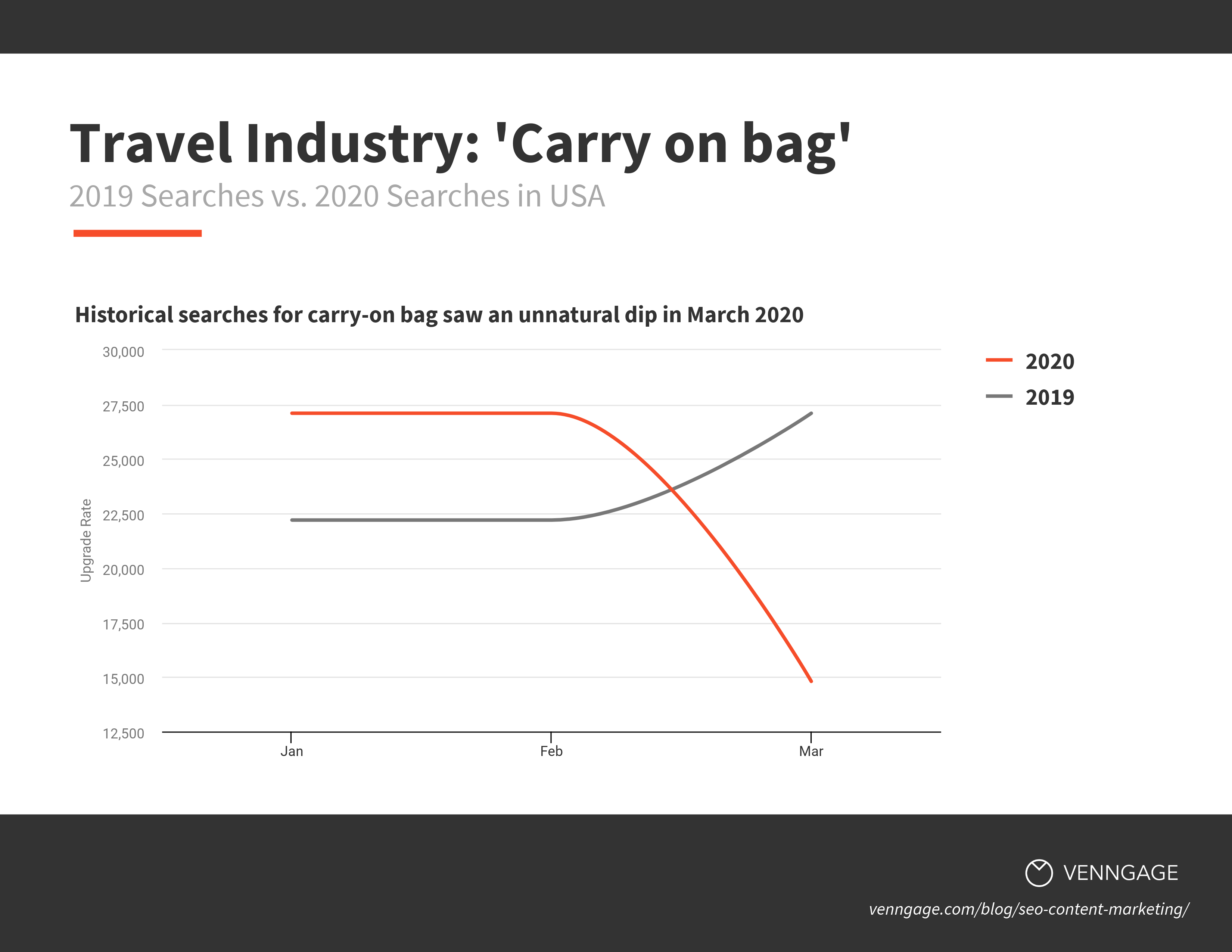
Unsurprisingly, with so few people traveling anywhere, the need for luggage has dipped dramatically.
At the same time, when we looked into home decor and organization, we found a massive spike in the pandemic period:
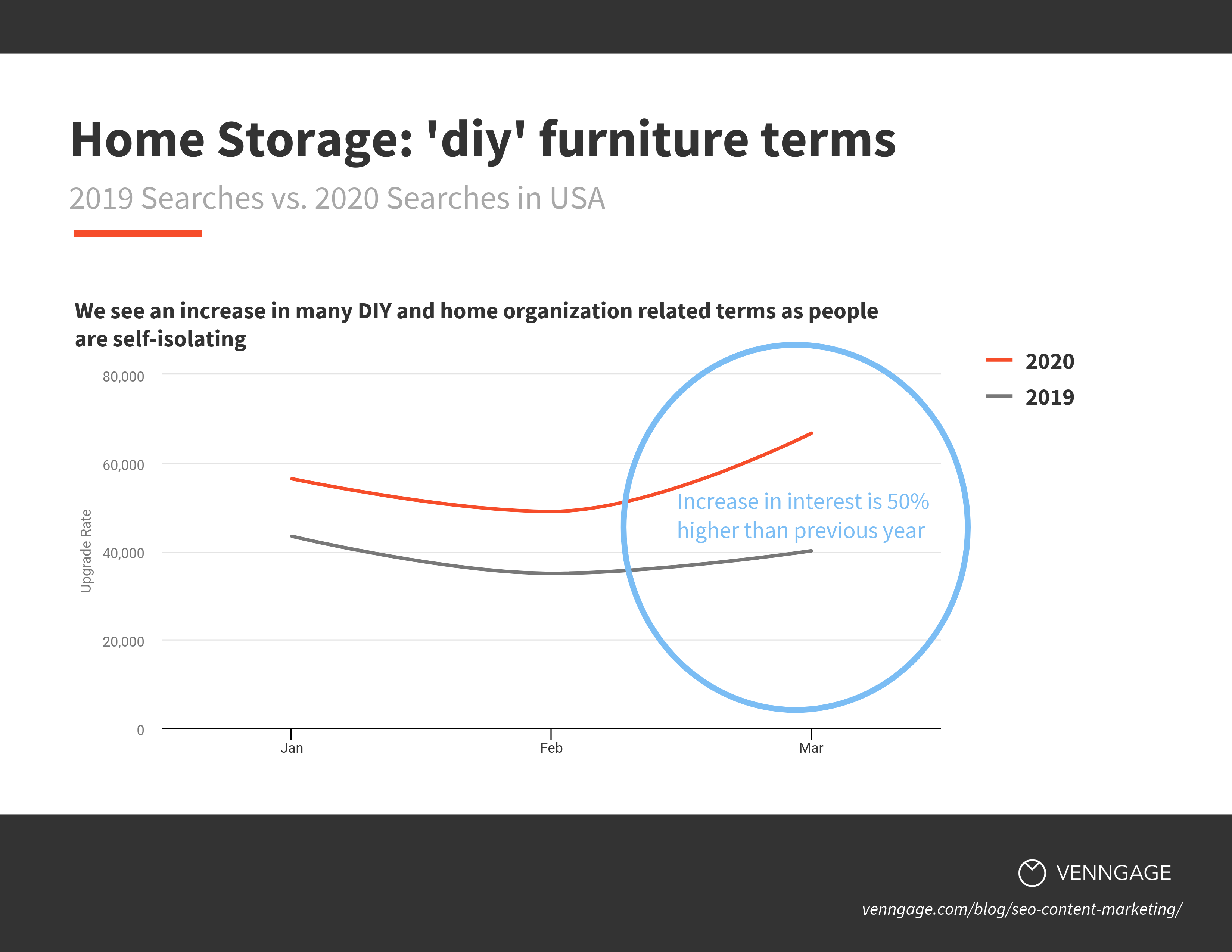
Here’s a closer look at the keyword associated with home decor and DIY:
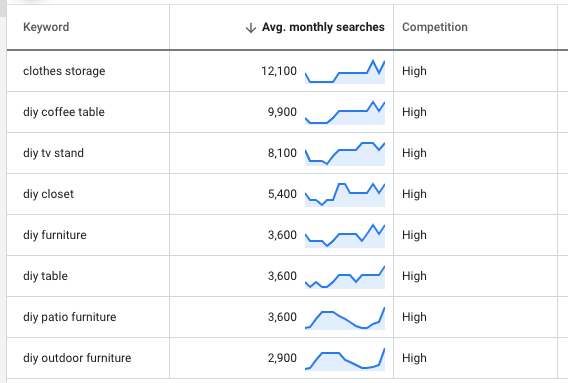
There are a lot of related keywords and they are all trending.
Right there you have your keywords to start building your content.
Start by creating titles that are optimized for the keywords becoming popular within this sphere.
Design pieces that specifically answer questions your audience may have – this makes it easier for them to find you.
Don’t limit your content streams – aim to create blogs, vlogs, social posts, charts, graphs, and infographics – so you can reach people where they are.
Closing Thoughts
Everything around us is changing – being adaptable to those changes is what will separate the innovative businesses from everyone else.
But adaptation without reason won’t make an impact.
You need to analyze the search trends that are impacting your company to drive cross-over content ideation and generate revenue.
To recap, this is how to do it:
- Search for market gaps.
- Analyze search trends.
- Pivot to customer needs.
- Adapt to the content framework.
- Generate ideas for crossover content.
Marketers have the tools available to them to influence the audience and drive a new narrative.
By using data and brainstorming new insights from what you find, you can thrive even in this crisis environment.
More Resources:
- Google Lists 5 Key Trends Shaping Consumer Behavior Amid COVID-19
- Key COVID-19 Search Trends & 5 Immediate PPC Strategies to Act On
- 3 New ‘Must-Know’ Trends for Marketing
Image Credits
In-Post Images: Venngage
Screenshots taken by author, May 2020





![AI Overviews: We Reverse-Engineered Them So You Don't Have To [+ What You Need To Do Next]](https://www.searchenginejournal.com/wp-content/uploads/2025/04/sidebar1x-455.png)